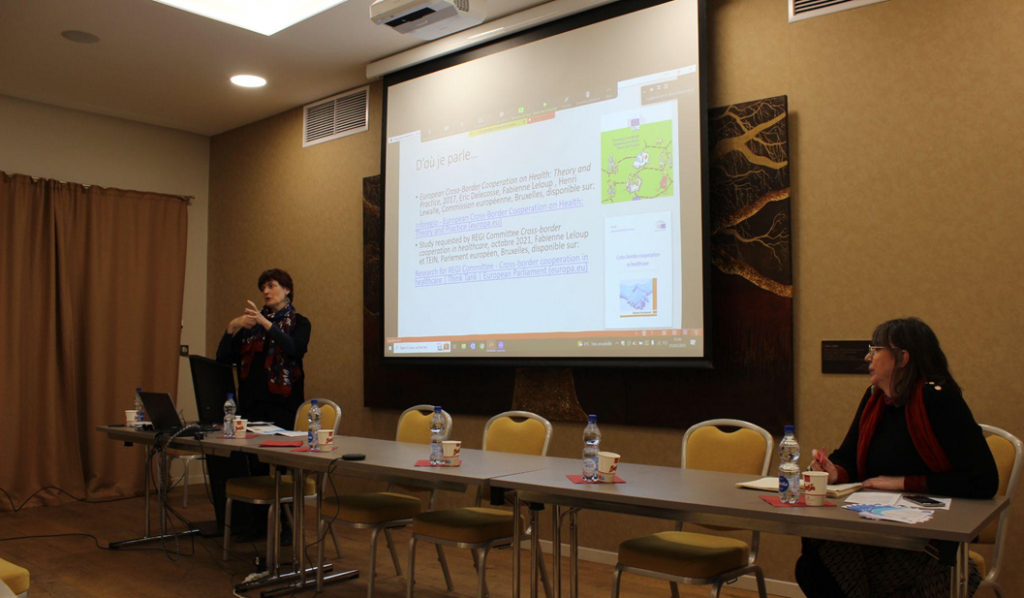Within the activities of the Jean Monnet Center and the Chair « European Narratives of the Border » of Jean Monnet Law, the first edition of Castle Talks 2023 was held on March 1 and 2, 2023.
Split between the Hochschule de Kehl and the Château de Pourtalès, it brought together seventy researchers, students and entrepreneurs. The conferences were numerous and the exchanges varied: cross-border health, Euroscepticism, cartopology or NASA programs and Catalan regionalism.
Cet article est également disponible dans la langue de Napoléon !
Within the framework of the Jean Monnet Chair of Law (Disputatio seminar), Fabienne Leloup of the Catholic University of Louvain spoke at the Castle Talks on Franco-Belgian cross-border health cooperation.
Fabienne Leloup is a political science professor and has participated in numerous publications, including the co-authored « European Cross-Border Cooperation on Health: Theory and Practice, 2017″ and « Cross-border cooperation in healthcare, October 2021″ with the TEIN network.

In her introduction, Fabienne Leloup went over the history and the law in the field of health in the European Union.
Indeed, this field is not a specific competence of the Union and acts as a complement to the States in the framework of the common market. However, the European Commission has progressively increased its actions since the 1990’s and the mad cow crisis, and has focused on the prevention of AIDS, cancer, drugs and pollution-related diseases. The Treaty of Lisbon (2007) has complemented these actions, its Article 168 deals with health and refers to the complementarity of cross-border regions. In addition, other initiatives have been taken: European health insurance card (2004), directive on patients’ rights (2011), etc.
Continuing her presentation, Ms. Leloup addressed the Franco-Belgian cross-border health care, particularly around the Lille conurbation.
In France, the Tourcoing hospital has developed expertise in AIDS, while on the other side of the border the Mouscron hospital has developed expertise in dialysis. In order to simplify the resolution of patients’ health concerns, an agreement has been signed between the two hospitals so that everyone can be treated on the other side of the border, all reimbursed by social security. Indeed, it is easier for a Belgian living on the border to be treated in France rather than in Brussels; the same goes for a French person. This agreement based on dialysis and AIDS has been developed and replicated elsewhere: German-Polish telemedicine and German-Belgian mental health care.
However, the latter had to be stopped. Indeed, if there are German-speaking Belgians able to go to Germany, the reverse is hardly a reality. The scheme was therefore stopped because of the budgetary imbalance to the detriment of Germany.
In addition, the countryside on the French-Belgian border is characterized by a lack of public services. The insurers therefore wanted to test the interoperability of the (French) carte vitale and the (Belgian) carte de mutuelle. This was approved by the European authorities because of the low population density and therefore the ease of managing reimbursements. Although it was necessary to develop a common vocabulary as well as the reception of foreigners in order to cooperate as well as possible, the system was a success and has been replicated along the entire French-Belgian border, with the support of INTERREG and local actors.
During the Covid crisis, cooperation between the hospitals of Mouscron and Tourcoing was fully functional: patient exchanges and inauguration of new services. However, the crisis led to the recentralization of health policy, depriving the hospitals of their autonomy and encouraging the closing of borders. Moreover, given the difference in laws and regulations between the two countries, there was considerable confusion among cross-border caregivers. Also, pandemic data was not calculated in the same way by Belgium compared to the Netherlands and Luxembourg. Indeed, the Belgians counted all deaths in the ehpads as covid-related deaths, leading to much more alarming statistics than elsewhere. Gradually, attempts were made to harmonize and gather data in the Meuse-Rhine region: harmonized national data, pooling of border data, disitrbution of these data by observatories to decision-makers. In addition, faced with the closure of borders, caregivers have united and obtained health passes.
The crisis as « a moment of revelation”
The crisis was « a moment of revelation », bringing to light the problems but also the pre-existing systems. Summary documents have been published by the European Commission to list the border systems.
« The cross-border scale is a good scale for trying out new projects ».
In addition, during the pandemic, INTERREG projects were reoriented to finance 3D printers to manufacture health equipment, produce masks, etc. The interest of this European program is that it accepts experimentation, allowing innovation and testing of new systems in cross-border areas. It should also be noted that INTERREG programs have an eventual impact after 12 years. However, according to Ms. Leloup, the regional operators are currently exhausted and are no longer able to innovate. We should not expect everything from them.
« Making Europe is often starting with terminology”
Following this presentation, Frédérique Berrod supported Mrs. Leloup’s remarks on the importance of harmonization, in particular of statistics and terminology: « Making Europe is often starting with terminology ». Continuing her speech, she also mentioned the importance of digital technology: « We have made free movement more fluid […] but there are still more or less watertight barriers […] Digital technology remains eminently compartmentalized ». Also, there is still progress to be made at the management level. For example, the tracking of cross-border healthcare applications is deficient ; French head of state admit that they have not thought about it, as they live far from cross-border concerns.
Her remarks were completed by Aude Bouveresse, the director of the CEIE, who insisted on the importance of cross-border health cooperation.



